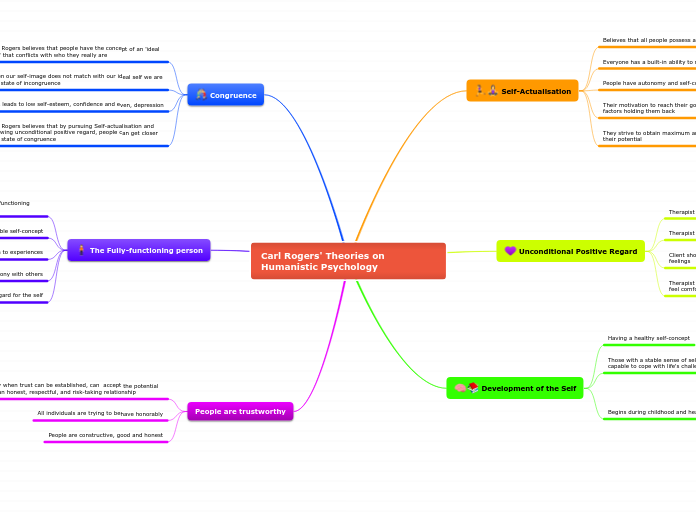Carl Rogers' Theories on Humanistic Psychology
Self-Actualisation
Believes that all people possess an inherent need to grow
Everyone has a built-in ability to reach their own goals
People have autonomy and self-control
Their motivation to reach their goal outweighs any external factors holding them back
They strive to obtain maximum amounts of themselves and their potential
Unconditional Positive Regard
Therapist must provide this
Therapist must accept the client as they are
Client should feel free to express both negative and positive feelings
Therapist must practise non-judgement and make the client feel comfortable during the session
Development of the Self
Having a healthy self-concept
Those with a stable sense of self were more confident and capable to cope with life's challenges
Begins during childhood and heavily influenced by parenting
Parenting
Children provided with unconditional love and positive regard grew up to have a healthier concept of self
Children who were neglected and made to feel like they had to 'earn' their parents' love may end up with low self-esteem and feelings of unworthiness
Congruence
Carl Rogers believes that people have the concept of an 'ideal self" that conflicts with who they really are
When our self-image does not match with our ideal self we are in a state of incongruence
This leads to low self-esteem, confidence and even, depression
Carl Rogers believes that by pursuing Self-actualisation and following unconditional positive regard, people can get closer to a state of congruence
The Fully-functioning person
Those who achieve congruency become a fully-functioning person
These people have a flexible self-concept
They are open to experiences
They are able to live in harmony with others
Unconditional regard for the self
People are trustworthy
Only when trust can be established, can accept the potential for an honest, respectful, and risk-taking relationship
All individuals are trying to behave honorably
People are constructive, good and honest
